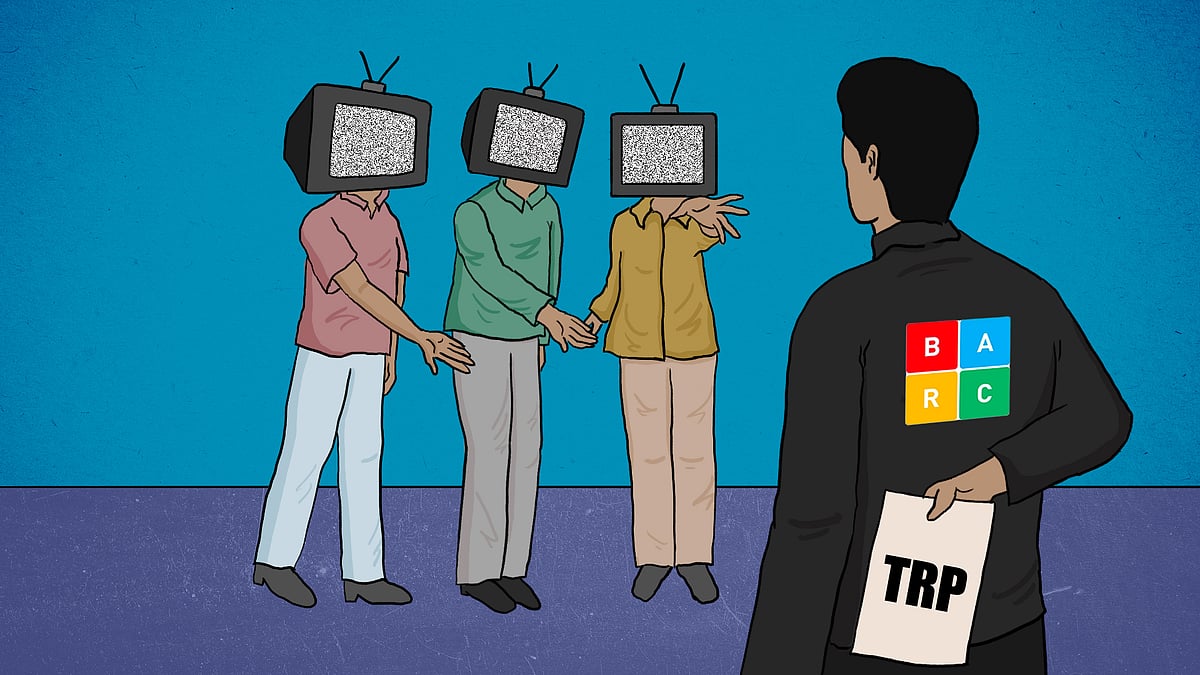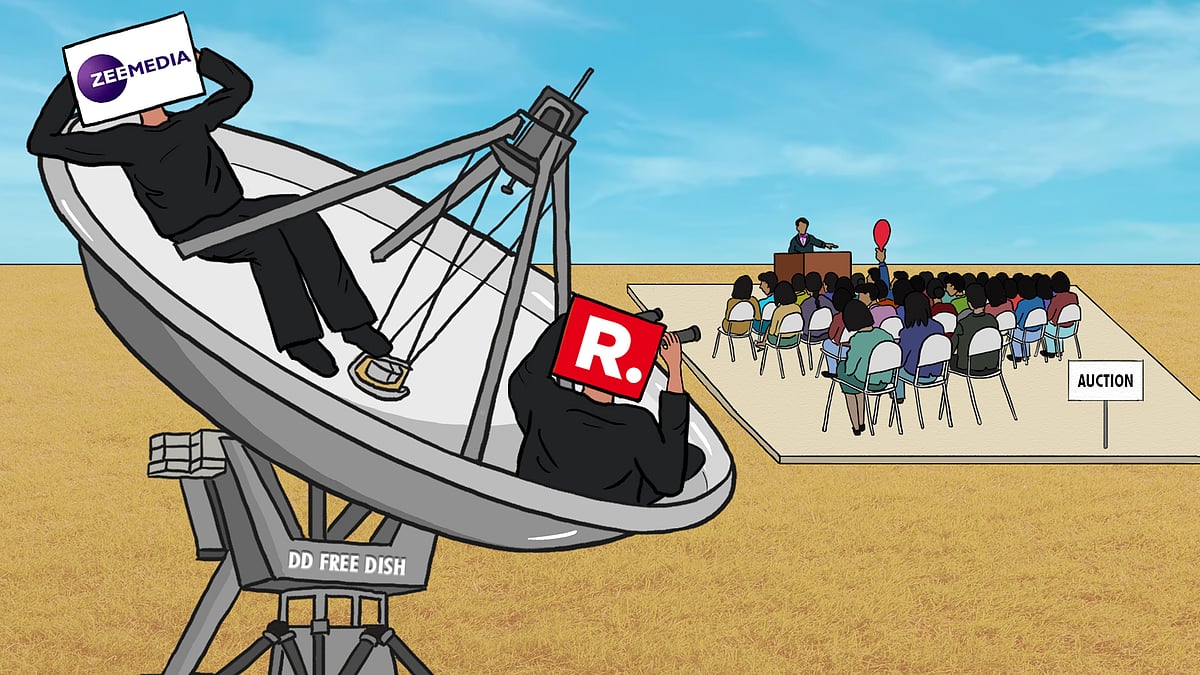Why news channels have approached the government against Zee
News networks allege that Zee news channels cornered chunks of the regional viewership by ‘illegally’ appearing on DD Free Dish.
With auctions for DD Free Dish slots for news channels kicking off earlier this month, dozens of networks are in a tight contest through auctions to reach 38 million regional viewers with Doordarshan’s free direct-to-home service. But the competition has doled out confrontation, when one channel has been perceived to have a dubious edge over others.
Since 2020, three news networks – ABP, TV9 and Network 18 – have approached the ministry of information and broadcasting against the Zee network, claiming the latter has illegally managed to put nine of its news channels – some national and others regional – on DD Free Dish without participating in auctions and paying for slots. They allege that this undermining of due process increases Zee network’s reach among millions of viewers, pushes up its TRPs, and gives it an “unfair advantage”.
Starting from zero in October 2019, sample the alleged market growth of a few Zee channels over six months: Zee UP-UK captured nearly half the share in Uttar Pradesh and Uttarakhand, Zee MP-Chhattisgarh expanded to 40.3 percent, and Zee Rajasthan’s presence shot up to 37.8 percent.
Newslaundry could not verify these figures even as a staffer at one of these networks claimed these were based on data released by the Broadcast Audience Research Council, or BARC, a body that measures TV viewership in India.
The loss to Prasar Bharati, networks allege, goes beyond Rs 100 crore. But the ministry has allegedly ignored the complaints; sources at these networks claim the I&B minister has not taken up the issue, nor has his secretaries.
The case against Zee
The earliest representation to the I&B ministry dates back to August 2020.
At the time, the ABP, News18 and TV9 networks had claimed that “Zee regional news channels are illegally being available on DD Free Dish and its adverse impact on other regional news channels, loss of revenue to Prasar Bharati and violation of law”.
Newslaundry has seen copies of similar representations made as recently as January this year, which lay out how the Zee network and private DTH company Dish TV put their channels on Free Dish.
“Till September 2019, Dish TV was illegally uplinking unencrypted Zee news regional channels from its DTH up-linking centre on to GSAT15 satellite,” they wrote. “This resulted in such unencrypted Zee news channels also becoming available on DD Free Dish without such channels participating in the auction and without paying the carriage fee which other broadcasters pay to be carried on DD Free Dish.”
Newslaundry had reported on this in December 2020. Dish TV had then denied the allegations that it uplinked Zee channels in an unencrypted form.
From November 2019, the networks claimed, Zee doubled down on its tactics. That month, Dish TV obtained government approval to uplink channels on Ku band – a technology that provides better transmission and needs a smaller dish – and began transmitting nine Zee news channels without encryption.
According to the networks, these regional news channels are Zee Bihar-Jharkhand, Zee MP-Chhattisgarh, Zee Punjab-Haryana-Himachal, Zee Rajasthan, Zee Salaam, Zee UP-UK, Zee 24 Taas, Zee Odisha and Zee 24 Kalak.
The channels are part of Zee Media Corporation Limited, or ZMCL, whose editor in chief is Jawahar Goel. Goel is also the chairman of Dish TV, which was launched by the Zee group in 2003. He’s the brother of Zee founder Subhash Chandra.
“Zee continued with its illegal act but now under the garb of another approval received from MIB,” the networks told the ministry. “This unfair advantage is discriminatory and not providing a level playing field to other broadcasters.
Nutgraf
If allegations of Zee gaming the Free Dish sound familiar, it’s because they are. In December 2020, Newslaundry had reported how Republic and Zee channels had flouted government guidelines to appear on the DTH service in 2017. Doordarshan then noticed this and told the two networks that it had received complaints that their channels were on Free Dish “illegally” and claimed that the manoeuvre diluted competition and defeated the purpose of auctioning.
The 2001 DTH guidelines dictate that all private networks must encrypt their channels since unencrypted transmission means anyone with a dish can watch the channel on their TV set for free. A violation of these guidelines invites revocation of a network’s licence and a penalty of up to Rs 50 crore.
This, however, does not apply to channels that obtain Free Dish slots. Their uplinking is not encrypted and so they are free-to-air channels, or FTA.
But Zee and Republic exploited a technical loophole on India’s communications satellite (called GSAT15) that allowed them to put eight channels on Free Dish airwaves through Dish TV, and as a consequence, in millions of Indian homes. “Such channels are available to viewers of DD Free Dish without any payment to Prasar Bharati,” the director general of Doordarshan had then told the I&B ministry.
In 2017, the conservative estimate of the loss that Republic and Zee’s circumvention of norms caused to the exchequer was nearly Rs 52 crore, since the reserve price for news channel slots on DD Free Dish stood at Rs 6.5 crore.
In 2019, the Republic media network started a Hindi news channel, Republic Bharat, and participated in auctions and bought a Free Dish slot.
The numbers
According to the networks that approached the ministry, the unauctioned channels have put “an additional leverage of approx. Rs. 130-140 crores to Zee Media group” since the network “is growing every day and taking over the market share of other channels who are compliant and not indulging in any illegal act.”
Newslaundry could confirm that at least 10 Zee news channels continue to be on Free Dish, when only two of them – Zee News and Zee Hindustan – have obtained the Prasar Bharati slots to do so.
In the regional news market in India, Zee competes actively with news channels of the ABP, TV9 and News18 networks.
ABP has ABP Ananda in Bengal, ABP Majha in Maharashtra, ABP Asmita in Gujarat, ABP Sanjha in Punjab and ABP Ganga in Uttarakhand and UP. TV9 has similar presence in most of these states – TV9 Marathi, TV9 Gujarati, TV9 Bangla and TV9 Bharatvarsh.
News18, the biggest group with 14 news channels in 15 languages, has a presence in each of these states.
Newslaundry reached out to the three networks for comment, but did not receive a response.
The anxiety caused by Zee’s intrusion is captured in numbers presented by three networks to the I&B ministry. They claim to show how the network’s regional channels used Free Dish to bloat their viewership between October 2019 and May 2020.
For instance, in Uttar Pradesh and Uttarakhand, news channel Zee UP-UK had no presence in the market of FTA channels. By April 2020, its share increased to 53 percent and was down to 50 percent in May – meaning it allegedly captured nearly half of the market in the two states in six months. In Madhya Pradesh and Chhattisgarh, between October 2019 and April 2020, Zee MP/Chhattisgarh’s market share jumped from zero percent to 40.3 percent. By May, this climbed further to 51 percent. Zee Rajasthan’s presence in the state market went up to 37.8 percent in April 2020 from zero percent in October 2019. A month later, it was up to 41 percent.
In their complaint, the networks alleged that unencrypted transmission of the nine Zee channels robbed the exchequer of “approx. Rs. 100 crores of licence fee payable to Prasar Bharati”.
According to Exchange4Media, in the 2021 Free Dish auctions, news channel slots sold for an average price of Rs 17.3 crore per slot.
The representation concluded with two demands by the networks: the withdrawal of permission to Dish TV for transmitting Zee channels on Ku band; and a direction to all networks to encrypt their channels when transmitted on Ku band.
Dish, Zee and ministry response
In a statement to Newslaundry, a Dish TV spokesperson said that the company “is not in a position to give any comment” since “the queries which are being raised by you form part of the subject matter in the Writ Petition no. W.P.(C) 2670/2020 which is pending before the Hon’ble High Court of Delhi on the same subject matter for adjudication”.
The spokesperson added that “in view of the pendency of the matter, you are also advised to refrain from making/ publishing any statement/story which, if published, would be contemptuous in nature and will also create bias against the Company.”
According to the DTH company, the allegations of unencrypted transmission were not factual: “Without going in the merits of the queries raised by you, we would like to state that in view of the earlier response of the Company, statements made in your query are factually incorrect and accordingly should not be relied upon.”
By “earlier response”, Dish TV seems to be referring to its statement in Newslaundry’s 2020 story, when it had claimed that Zee channels were uplinked on Ku band after permission from the I&B ministry in November 2019.
“Having regard to the query raised by you, we would like to remind you that similar queries were raised by you on 03.12.2020 which was suitably replied by the company on 07.12.2020,” the company said. “We are dismayed that the same queries have been raised again, albeit with some modification clearly in order to show the same as fresh queries. This raises serious doubts on the very fairness of the story intended to be published by you.”
As for the government, according to the staffer at one of the news networks, the I&B ministry has not responded to the representations made by the three channels over two years. But it is not as if the ministry is unaware.
In February 2021, Prakash Javadekar, then I&B minister, was asked in the Lok Sabha whether his government had received any complaints from Doordarshan about the circumvention of Prasar Bharati’s auctions by private TV channels. Javadekar acknowledged that a “reference was received from Prasar Bharati regarding reception of some channels of the private broadcasters on the Set Top Boxes of DD Free Dish subscribers which were not part of channels downlinkable from that platform”.
He added that the situation had “arisen due to co-location of signals and non-mandatory requirement for encryption of signals of a Free-to-Air TV Channel”. The minister said that he would “address this issue in the new uplinking and downlinking guidelines for private TV channels to be notified by the government”.
Newslaundry sent a set of questions to the I&B ministry and Zee Media. This story will be updated if we receive a response.
 TRP scam: BARC’s ratings suspension has news channels worried, but not advertisers
TRP scam: BARC’s ratings suspension has news channels worried, but not advertisers How Republic TV and Zee Media ‘illegally’ reached millions of viewers
How Republic TV and Zee Media ‘illegally’ reached millions of viewersNL Events
Newslaundry Events: From The Media Rumble to NL Chats and webinars, updates and details on latest Newslaundry events.
